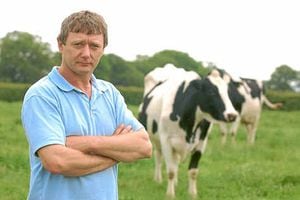Who's milking profits from the price of a pint?
Today, Andy Richardson reveals how supermarket price wars are driving down earnings for under-pressure dairy farmers

Today, Andy Richardson reveals how supermarket price wars are driving down earnings for under-pressure dairy farmers
Are farmers laughing all the way to the bank as they milk their herds of pint upon pint of liquid gold?
No, not a bit of it. The way things are right now, farmers are lucky if they have enough left over at the end of the month to pay their electricity bill.
The average profit for a typical Shropshire farmer is less than 1p per pint– and that's if they are lucky. Some farmers make a loss on their milk and countless are considering selling their dairy herds.
There was a time, not so long ago, when milk processors made good margins on the cost of a pint of milk. Not any more. In recent years, processors have been squeezed so hard that they now receive next to nothing when they sell a pint.
They used to make comfortable margins, but those have been reduced in recent times as processors were targeted by supermarkets – who realised that they'd already squeezed farmers virtually dry.
So who is the winner when you shell out on a carton of semi-skimmed? The answer is easy: the supermarkets. Typically, a supermarket will make a 6p profit for a single pint of milk. It also factors in the cost of selling the milk – which is accounted for by the cost of premises, wages and other shop-based overheads. The cost of selling the milk is around 4p per pint.
Andrew Bebb is a well known Shropshire farmer who has seen his business squeezed and squeezed and squeezed in recent years. Mr Bebb, who has an organic 195-acre farm at Hanwood, says locals have been feeling the squeeze for a long time. He says the cost of producing a litre of milk varies from farm to farm. However, most farms make less than 1p per pint, with many now making a loss.
Mr Bebb says: "The supermarkets have had a price war for about 18 months. Stores have been virtually giving milk away and it doesn't do the industry any good because it forces others to do it.
"Cheap milk attracts people into shops and then they do their grocery shop. But don't believe for a moment that supermarkets are selling cheap milk as a loss leader. If farmers get a particular price for their milk – with virtually no profit – there is still a significant margin to be divided between processors and the supermarkets. Yes, there are costs in there, but there's also a lot of profit."
Mr Bebb adds: "There is something that can be done about this: we could get an ombudsman with teeth who would stop supermarkets from penalising farmers.
"The bottom line is this: if supermarkets are discounting milk and selling it cheaply, they're passing on the reduced margins to farmers and processors – and still taking their own profit.
"The industry is shrinking and shrinking. When the Milk Marketing Board split up in the mid 1980s, there were 28,000 milk producers, now there are fewer than 10,000. The number of dairy cows at that time was 2.8 million, now the figure is down to 1.8 million."
The latest price war has seen High Street supermarkets duking it out with smaller chains, like Poundland, which ran a major campaign encouraging new customers to buy two litres of milk for £1.
The company was confident that its headline-grabbing offer would attract huge numbers of customers to its outlets, including ones in Shrewsbury and Telford. But farmers like Mr Bebb, and dozens of others in Shropshire, are the ones who've been caught in the crossfire.
Low prices might be good news for consumers, but they are bad news for Shropshire farmers – and as the past week's developments show, could even put some of them out of business.
Bill Higgins, who produces milk for Tesco, at Pulverbatch, near Shrewsbury, was among the 600-strong delegation of farmers who attended last week's crisis meeting at the Staffordshire County Showground.
He says many farmers in Shropshire now receive next to no profit for a pint. "The margins that farmers are working on are ridiculous. The processors have been squeezed by the supermarkets,"he said.
The price of milk charged by supermarkets varies enormously. Savvy shoppers can take advantage of deals at outlets like Asda, Tesco, Sainsbury's and Morrisons, who all try to compete for the lowest prices.
Those who want organic milk or particular brands, like Gold Top or Duchy Originals, pay much more – though, again, it's the supermarkets who make the biggest profits.
A pint of Gold Top, for instance, costs about 62p.
Supermarkets are unrepentant, even if more farmers end up going to the wall. Poundland says its latest offer has proved a hit with customers. A spokeswoman said: "Our customers are increasingly using Poundland to do their weekly shop, so we are stocking groceries like milk, eggs and bread. It is a good opportunity for customers to do their shopping at a value price. We don't want to be drawn into a debate about farmers' profit margins, however."
Bill Higgins, remains unimpressed saying: "We've faced huge increases in costs, with electricity, water, fuel and labour – not to mention feed – all going up more quickly than the rate of inflation. On many farms, families work without a wage, too.
"Unless something is done, the dairy sector will contract and contract and the land will be put to a different use."





